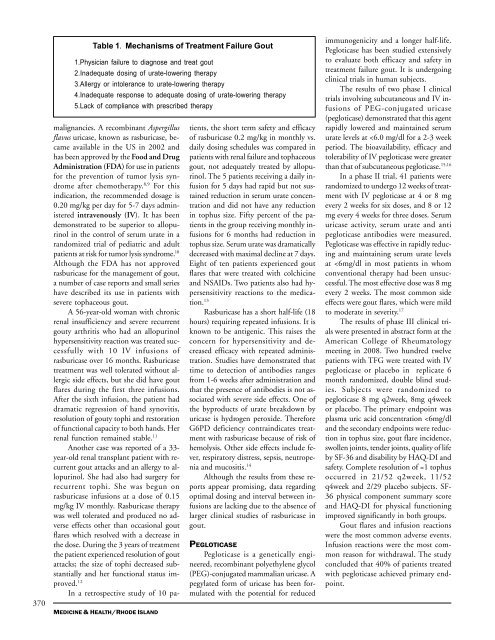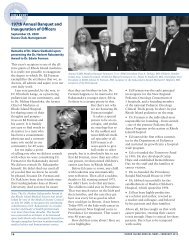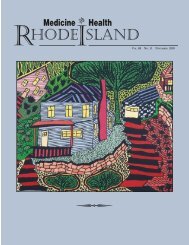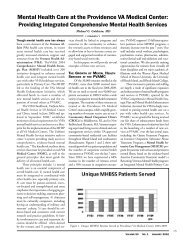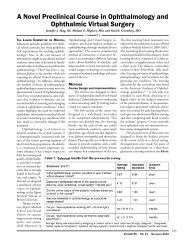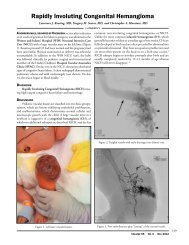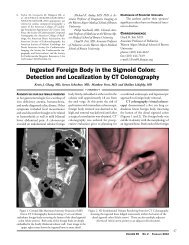Hyperuricemia & Gout - Rhode Island Medical Society
Hyperuricemia & Gout - Rhode Island Medical Society
Hyperuricemia & Gout - Rhode Island Medical Society
Create successful ePaper yourself
Turn your PDF publications into a flip-book with our unique Google optimized e-Paper software.
370<br />
Table 1. Mechanisms of Treatment Failure <strong>Gout</strong><br />
1.Physician failure to diagnose and treat gout<br />
2.Inadequate dosing of urate-lowering therapy<br />
3.Allergy or intolerance to urate-lowering therapy<br />
4.Inadequate response to adequate dosing of urate-lowering therapy<br />
5.Lack of compliance with prescribed therapy<br />
MEDICINE & HEALTH/RHODE ISLAND<br />
malignancies. A recombinant Aspergillus<br />
flavus uricase, known as rasburicase, became<br />
available in the US in 2002 and<br />
has been approved by the Food and Drug<br />
Administration (FDA) for use in patients<br />
for the prevention of tumor lysis syndrome<br />
after chemotherapy. 8,9 For this<br />
indication, the recommended dosage is<br />
0.20 mg/kg per day for 5-7 days administered<br />
intravenously (IV). It has been<br />
demonstrated to be superior to allopurinol<br />
in the control of serum urate in a<br />
randomized trial of pediatric and adult<br />
patients at risk for tumor lysis syndrome. 10<br />
Although the FDA has not approved<br />
rasburicase for the management of gout,<br />
a number of case reports and small series<br />
have described its use in patients with<br />
severe tophaceous gout.<br />
A 56-year-old woman with chronic<br />
renal insufficiency and severe recurrent<br />
gouty arthritis who had an allopurinol<br />
hypersensitivity reaction was treated successfully<br />
with 10 IV infusions of<br />
rasburicase over 16 months. Rasburicase<br />
treatment was well tolerated without allergic<br />
side effects, but she did have gout<br />
flares during the first three infusions.<br />
After the sixth infusion, the patient had<br />
dramatic regression of hand synovitis,<br />
resolution of gouty tophi and restoration<br />
of functional capacity to both hands. Her<br />
renal function remained stable. 11<br />
Another case was reported of a 33-<br />
year-old renal transplant patient with recurrent<br />
gout attacks and an allergy to allopurinol.<br />
She had also had surgery for<br />
recurrent tophi. She was begun on<br />
rasburicase infusions at a dose of 0.15<br />
mg/kg IV monthly. Rasburicase therapy<br />
was well tolerated and produced no adverse<br />
effects other than occasional gout<br />
flares which resolved with a decrease in<br />
the dose. During the 3 years of treatment<br />
the patient experienced resolution of gout<br />
attacks; the size of tophi decreased substantially<br />
and her functional status improved.<br />
12<br />
In a retrospective study of 10 patients,<br />
the short term safety and efficacy<br />
of rasburicase 0.2 mg/kg in monthly vs.<br />
daily dosing schedules was compared in<br />
patients with renal failure and tophaceous<br />
gout, not adequately treated by allopurinol.<br />
The 5 patients receiving a daily infusion<br />
for 5 days had rapid but not sustained<br />
reduction in serum urate concentration<br />
and did not have any reduction<br />
in tophus size. Fifty percent of the patients<br />
in the group receiving monthly infusions<br />
for 6 months had reduction in<br />
tophus size. Serum urate was dramatically<br />
decreased with maximal decline at 7 days.<br />
Eight of ten patients experienced gout<br />
flares that were treated with colchicine<br />
and NSAIDs. Two patients also had hypersensitivity<br />
reactions to the medication.<br />
13 Rasburicase has a short half-life (18<br />
hours) requiring repeated infusions. It is<br />
known to be antigenic. This raises the<br />
concern for hypersensitivity and decreased<br />
efficacy with repeated administration.<br />
Studies have demonstrated that<br />
time to detection of antibodies ranges<br />
from 1-6 weeks after administration and<br />
that the presence of antibodies is not associated<br />
with severe side effects. One of<br />
the byproducts of urate breakdown by<br />
uricase is hydrogen peroxide. Therefore<br />
G6PD deficiency contraindicates treatment<br />
with rasburicase because of risk of<br />
hemolysis. Other side effects include fever,<br />
respiratory distress, sepsis, neutropenia<br />
and mucositis. 14<br />
Although the results from these reports<br />
appear promising, data regarding<br />
optimal dosing and interval between infusions<br />
are lacking due to the absence of<br />
larger clinical studies of rasburicase in<br />
gout.<br />
PEGLOTICASE<br />
Pegloticase is a genetically engineered,<br />
recombinant polyethylene glycol<br />
(PEG)-conjugated mammalian uricase. A<br />
pegylated form of uricase has been formulated<br />
with the potential for reduced<br />
immunogenicity and a longer half-life.<br />
Pegloticase has been studied extensively<br />
to evaluate both efficacy and safety in<br />
treatment failure gout. It is undergoing<br />
clinical trials in human subjects.<br />
The results of two phase I clinical<br />
trials involving subcutaneous and IV infusions<br />
of PEG-conjugated uricase<br />
(pegloticase) demonstrated that this agent<br />
rapidly lowered and maintained serum<br />
urate levels at


